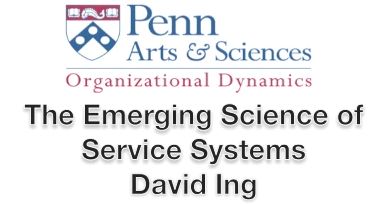I attended the Memorial Service for Russell Ackoff at the University of Pennsylvania in February. Since I was already in Philadelphia, I was invited to hang out for an extra day to present at the Organizational Dynamics Lecture Series, as part of the master’s program in the School of Arts and Sciences. I gave a talk on “The Emerging Science of Service Systems”, based on the research that I’ve been doing since I first saw Jim Spohrer speak at the ISSS 2005 meeting in Cancun.
I had previously posted the slides for the talk on the Coevolving Innovation Commons Publications archive. An outline for the talk is as follows:
- A. Introduction
- B. The “new service economy” and SSMED
- C. The systems in service systems
- D. Artifacts / feeds to follow
The presentation is now available as a web video on the University of Pennsylvania media site for the School of Arts and Sciences.
I’m one, but not the only, researcher looking into Service Science, Engineering, Management and Design from the foundations of a systems approach. A group from the ISSS has been having conversations on the emerging science. Following the question-and-answer period after the formal talk, some students stayed on to ask questions about systems in more depth. The University of Pennsylvania, with a long tradition of systems thinking, continues to attract students with that interest!
The Organizational Dynamics program is now the home of the Russell Lincoln Ackoff Systems Thinking Library. … Read more (in a new tab)



